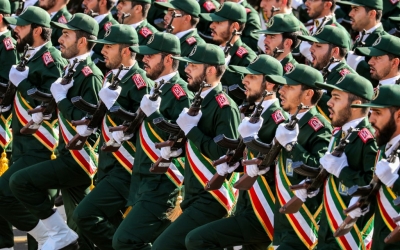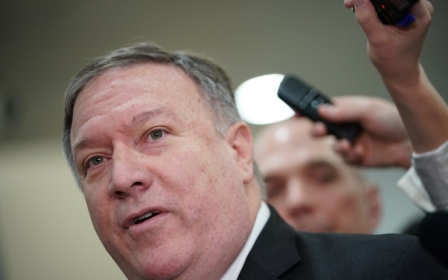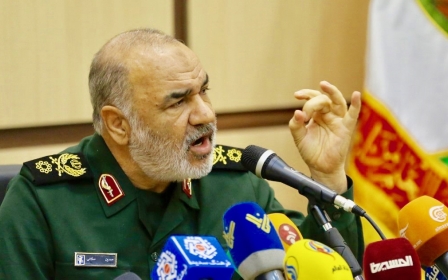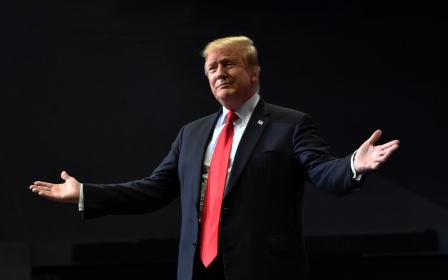No more US sanction exemptions for countries buying oil from Iran, Pompeo says
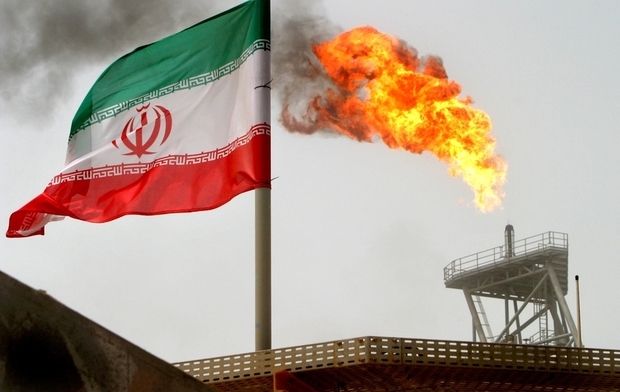
The United States will stop granting waivers for countries buying oil from Iran, making them subject to US financial sanctions, Secretary of State Mike Pompeo has said.
Washington's oil-producing allies, including Saudi Arabia and the United Arab Emirates, have agreed to keep the market adequately supplied in anticipation of the new measures, Pompeo said during a media briefing on Monday.
The secretary of state added that US President Donald Trump's administration has taken Iranian oil exports to "historic lows", saying that sanctions have denied Tehran "well-north of $10bn" since they came into effect late last year.
After re-imposing sanctions on the Iranian oil sector, Washington granted exemptions to China, India, Japan, South Korea, Taiwan, Turkey, Italy and Greece, giving them time to wean their economies off Iranian oil.
Greece, Italy and Taiwan have already ceased importing Iranian oil.
New MEE newsletter: Jerusalem Dispatch
Sign up to get the latest insights and analysis on Israel-Palestine, alongside Turkey Unpacked and other MEE newsletters
The current exemptions expire on 2 May, but Pompeo refused to elaborate on how forcefully and quickly the sanctions will be enforced on the eight nations, which include close US allies.
Oil prices jumped overnight on reports of the action by the United States.
US benchmark West Texas Intermediate for May delivery closed up another 2.7 percent at $65.70 a barrel, while Brent crude in London rose 2.9 percent to $74.04.
Backing Trump's comments, Saudi Arabia's Energy Minister Khalid al-Falih said the kingdom would work to "stabilise" the oil market.
Turkey, a US NATO partner, was quick to denounce Washington's decision on Monday. Turkish Foreign Minister Mevlut Cavusoglu warned that ending the waivers "will not serve regional peace and stability".
"We won’t accept unilateral sanctions and the impositions that aim to shape how we should establish relations with our neighbours," Cavusoglu added in a statement.
Violating US trade regulations would make the countries subject to sanctions from Washington. Countries buying Iranian oil would also risk being cut off by leading American and global financial institutions that deal in the US dollar.
In May 2018, Trump pulled the US from the Joint Comprehensive Plan of Action, the deal between Tehran and world powers that saw Iran drastically scale back its nuclear programme in exchange for the easing of sanctions against its economy.
"The United States has been in constant discussion with our allies and partners to help them transition away from Iranian crude to other alternatives," Pompeo said on Monday.
"And we have been working with major oil-producing countries to make sure the market has sufficient volume to minimise the impact on pricing. Both the kingdom of Saudi Arabia and the United Arab Emirates have assured us they will ensure an appropriate supply for the markets."
Riyadh echoed Pompeo's statement on Monday, saying that it is working with other oil suppliers to keep the market stable.
"The Kingdom would like to reiterate its long-standing policy of working towards oil market stability at all times," Saudi Energy Minister Khalid Al-Falih, said in a statement as reported by the official news agency SPA.
"Accordingly, Saudi Arabia will coordinate with fellow oil producers to ensure adequate supplies are available to consumers while ensuring the global oil market does not go out of balance."
Washington's European allies have rejected Trump's withdrawal from the nuclear deal, vowing to keep the agreement alive.
The European Union has established a trade system with Iran that allows member states to continue to sell certain goods to Iran, including medicine and food, without being in direct violation of US sanctions.
Turkey's Cavusoglu said last week that Ankara is also looking to set up a similar system with Tehran.
Middle East Eye delivers independent and unrivalled coverage and analysis of the Middle East, North Africa and beyond. To learn more about republishing this content and the associated fees, please fill out this form. More about MEE can be found here.


